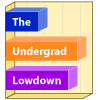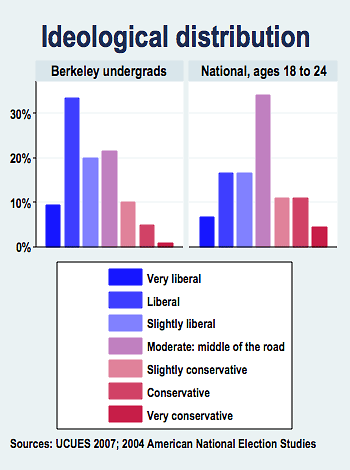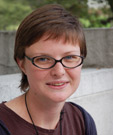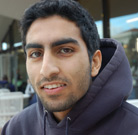UC Berkeley Press Release

|
The undergrad lowdown
Growing convictions:
Students' political leanings, religious identification,
and community engagement
 Five-part series: Five-part series: A 360-degree view of a student body • Roots
& Identity: Family background, keeping in touch with home,
campus personas • The
ABCs of UCUES: How the survey is conducted |
BERKELEY — This five-part series paints a portrait of the UC Berkeley student body based on the recently released findings of the 2007 University of California Undergraduate Experience Survey (UCUES) and several smaller surveys conducted by the campus's Office of Student Research.
Today's installment highlights undergrads' political leanings and voting habits, religious identification, and community service.
In this 2008 election year, pols and pundits of all stripes are keenly interested in reading the minds of the Millennial Generation. Will Mitt, Mike, or John bring a new influx of young voting-age Americans to the polls? Could Hillary or Barak inspire the young not just to vote but to staff a phone bank or canvas door-to-door?
To read the tea leaves in our campus's small (and admittedly atypical) corner of the political universe, the 2007 UCUES is an excellent place to start. According to the survey, many UC Berkeley students vote: 55% of those who were eligible to vote say they cast a ballot in the November 2006 mid-term election. (OK, you might want to take that stat with a tiny pinch of salt: political-science research has consistently shown that surveys over-report actual voter turnout by several percentage points.) As a rough comparison to overall youth turnout, the nonprofit group CIRCLE, using 2006 National Election Pool exit polls, estimated turnout for eligible voters ages 18 to 29 at 24% nationally and 25% in California.
 Berkeley
undergrads lean leftwards - though perhaps not as
far to port as some may imagine. Sixty-three percent
consider themselves slightly to very liberal, 22%
are in the middle of the road, 16% call themselves
some flavor of conservative. Party identification
is similarly skewed: self-identified Democrats outnumber
the GOP-identified by more than five to one. Given
their political leanings, it's not surprising that
55% of Cal undergrads believe the U.S. is moving
in the wrong direction, while only 8% believe it
is moving in the right one. (The other 37% say they
don't know.)
Berkeley
undergrads lean leftwards - though perhaps not as
far to port as some may imagine. Sixty-three percent
consider themselves slightly to very liberal, 22%
are in the middle of the road, 16% call themselves
some flavor of conservative. Party identification
is similarly skewed: self-identified Democrats outnumber
the GOP-identified by more than five to one. Given
their political leanings, it's not surprising that
55% of Cal undergrads believe the U.S. is moving
in the wrong direction, while only 8% believe it
is moving in the right one. (The other 37% say they
don't know.)
Following current affairs
According to UCUES, 30% of undergrads follow current affairs most of the time and another 35% keep up some of the time. For the UCUES survey - administered in spring 2007, about a year and a half before the 2008 presidential election - 41% said they were very interested in the contest and another 40% were somewhat interested.
— Caitlin Garvey, comparative literature major |
- Rishi Malhotra, political science major |
They've got attitude: Agree somewhat or strongly: • U.S. made a mistake in sending troops to Iraq – 89% • Abortion should be legal – 83% • Same-sex couples should have the right to legal marital status – 82% • Death penalty should be abolished – 55% • Undocumented immigrants should be denied access to public education – 28% |
For the civic-minded, electoral politics isn't the only game in town, of course. During the 2006-07 academic year, 42% of Berkeley undergrads boycotted a company's products to protest its political or social values, 38% participated in a political meeting or rally (though only 7% did so somewhat to very often), 26% joined a protest or demonstration (just 4% somewhat to very often), 23% worked for a political campaign (4% somewhat to very often), 16% wrote to an elected official, and 14% donated money to a political cause. (Thanks to the 2008 presidential election, it's reasonable to expect that more students will get involved in political campaigns this spring and summer than were involved a year ago.)
Articles of faith
Undergrads were asked to identify their religious preference from a list of 20 faiths, running the gamut from Baptist to Jewish, Muslim, Sikh, and Taoist. With so many ways to split the pie, no single religious identification claimed a plurality of the campus's diverse student body. Fourteen percent are Roman Catholic, 7% are Buddhist. Members of various Protestant denominations are tabulated separately; combined they account for close to a quarter of undergrads; "other Christian" accounts for 9%. To a separate question - "Do you consider yourself a Born-Again Christian?" - 13% say yes.
The most popular religious choice, for 44%, was "none." That a large number decline to identify with an organized religion is not unique to UC Berkeley, according to David Radwin of the Office of Student Research - but it does raise interesting questions. Research suggests, for starters, that many of these young people, especially those raised in religion, will re-attach themselves to that faith once they start their own families.
For another take on this subject, Radwin suggests the work of UC Berkeley sociologists Michael Hout and Claude Fischer. In "Why More Americans Have No Religious Preference," a 2002 article in the American Sociological Review, the two sought to explain a sharp increase (from 7% to 14%) over the course of the 1990s in the percentage of American adults who say they identify with no particular faith. Noting that many of these people consider themselves "spiritual," the authors argue that the spike represents "new religious dissenters" who "have distanced themselves from the churches, not from God.
"Organized religion linked itself to a conservative social agenda in the 1990s," they write, "and that led some political moderates and liberals ... to declare that they have no religion."
Although UCUES does not deeply probe students' spiritual activities or attitudes toward religious organizations, national surveys suggest that those who profess "no religion" may not be so different from students with a stated religious preference. "On average, people with no religious preference prayed less often than others did, but 93% reported praying sometimes and 20% reported praying every day," Hout and Fischer report. "The key fact ... about people who express no religious belief is that most are believers of some sort, and many are quite conventional. Relatively few are secular, agnostic, or atheist."
In the future, Radwin says, the university will probably add wording to the UCUES survey in order to shed light on subtler shades of student spirituality and belief.
Civic engagement
A newly release nationwide study, "Millennials Talk Politics," finds that today's college students - who "have come of age at a time of closely contested national elections, ideological polarization, terrorist attacks, and war" - are more "engaged," on the whole, than Generation Xers (those born between 1965 and 1985). Though ambivalent about formal politics, it says, Millennials tend to look to local efforts, volunteering, and service learning as a way to make things better.
This trend is reflected at UC Berkeley: just under half (48%) of undergraduates take part in some form of community service or volunteer activity, spending three hours per week, on average, on such activities, especially on tutoring, mentoring, and outreach. "To help other people" was their most-cited motivation (for 32%), followed by "to learn more about the community (18%) and "to meet people and make friends" (17%). Twenty-two percent of undergrads report having enrolled in an academic course with a public-service component — and more are likely to do so by the time they graduate.
Next: New on Campus — The freshman and transfer-student experience


 'I'm
involved in a group called Students for Social
Change. We’re trying to identify what
the problems are, especially in Berkeley, and
in American society as a whole. There’s
a lot of injustices — people who don’t
have housing, don’t have food; and then
there’s people who have so much. We’re
trying to figure things out.'
'I'm
involved in a group called Students for Social
Change. We’re trying to identify what
the problems are, especially in Berkeley, and
in American society as a whole. There’s
a lot of injustices — people who don’t
have housing, don’t have food; and then
there’s people who have so much. We’re
trying to figure things out.' 'I
think the political atmosphere on campus
is pretty healthy. The College Republicans
and the Cal Democrats don't stab each other.
There recently was a whole week devoted to
bashing Islam; that was kind of nuts. But
then there was the counter-protest; that
was kind of cool.'
'I
think the political atmosphere on campus
is pretty healthy. The College Republicans
and the Cal Democrats don't stab each other.
There recently was a whole week devoted to
bashing Islam; that was kind of nuts. But
then there was the counter-protest; that
was kind of cool.'